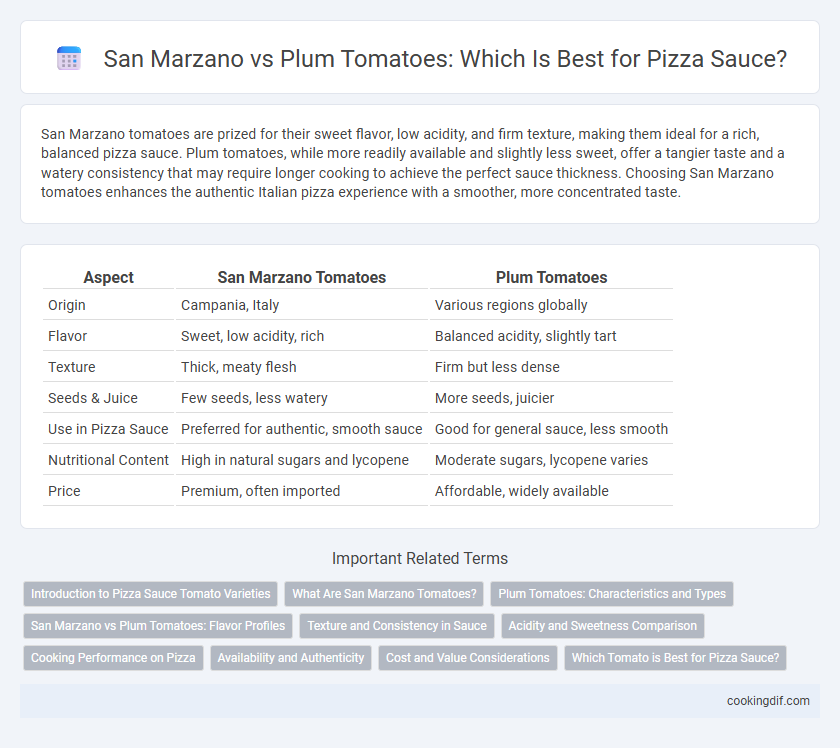San Marzano tomatoes are prized for their sweet flavor, low acidity, and firm texture, making them ideal for a rich, balanced pizza sauce. Plum tomatoes, while more readily available and slightly less sweet, offer a tangier taste and a watery consistency that may require longer cooking to achieve the perfect sauce thickness. Choosing San Marzano tomatoes enhances the authentic Italian pizza experience with a smoother, more concentrated taste.
Table of Comparison
| Aspect | San Marzano Tomatoes | Plum Tomatoes |
|---|---|---|
| Origin | Campania, Italy | Various regions globally |
| Flavor | Sweet, low acidity, rich | Balanced acidity, slightly tart |
| Texture | Thick, meaty flesh | Firm but less dense |
| Seeds & Juice | Few seeds, less watery | More seeds, juicier |
| Use in Pizza Sauce | Preferred for authentic, smooth sauce | Good for general sauce, less smooth |
| Nutritional Content | High in natural sugars and lycopene | Moderate sugars, lycopene varies |
| Price | Premium, often imported | Affordable, widely available |
Introduction to Pizza Sauce Tomato Varieties
San Marzano tomatoes, prized for their sweet flavor and low acidity, are often considered the gold standard for authentic Italian pizza sauce, grown in the volcanic soil near Mount Vesuvius. Plum tomatoes, including Roma varieties, offer a firm texture and balanced sweetness that make them a versatile alternative in pizza sauce recipes worldwide. The choice between San Marzano and plum tomatoes significantly influences the sauce's taste profile, consistency, and overall pizza quality.
What Are San Marzano Tomatoes?
San Marzano tomatoes are a prized variety of plum tomato known for their sweet flavor, low acidity, and firm pulp, making them ideal for authentic Italian pizza sauce. Grown in the volcanic soil of the San Marzano region near Naples, Italy, these tomatoes exhibit a unique balance of sweetness and tanginess that enhances sauce depth. Compared to regular plum tomatoes, San Marzano tomatoes have fewer seeds and thicker flesh, providing a richer texture and more concentrated flavor essential for traditional Neapolitan pizza sauces.
Plum Tomatoes: Characteristics and Types
Plum tomatoes, known for their dense flesh and low moisture content, are ideal for rich, thick pizza sauces. Varieties such as Roma and Amish Paste offer concentrated flavor and fewer seeds, resulting in a smoother texture. Their robust sweetness and balanced acidity make them a versatile choice for enhancing traditional and modern pizza recipes.
San Marzano vs Plum Tomatoes: Flavor Profiles
San Marzano tomatoes offer a sweeter, less acidic flavor with a rich, balanced taste ideal for pizza sauce, while plum tomatoes tend to be more tart and less complex. The San Marzano variety's thick flesh and low seed content create a smooth, velvety texture that enhances sauce consistency. In comparison, plum tomatoes yield a more watery sauce with a sharper tomato essence, making San Marzano tomatoes the preferred choice for authentic Italian pizza sauces.
Texture and Consistency in Sauce
San Marzano tomatoes offer a smoother texture and thicker consistency in pizza sauce compared to regular plum tomatoes, which tend to be more watery and chunky. The dense flesh of San Marzano tomatoes yields a rich, velvety sauce that clings better to pizza dough, enhancing overall flavor absorption. This consistent texture is preferred by chefs aiming for a balanced, authentic Neapolitan-style pizza sauce.
Acidity and Sweetness Comparison
San Marzano tomatoes are prized for their balanced acidity and natural sweetness, making them ideal for pizza sauce with a rich, smooth flavor. Plum tomatoes tend to have higher acidity levels but less inherent sweetness, resulting in a tangier sauce that may require added sugar for balance. The lower acidity and sweeter profile of San Marzano tomatoes contribute to a more harmonious and authentic pizza sauce taste.
Cooking Performance on Pizza
San Marzano tomatoes offer a balanced sweetness and low acidity, creating a smooth, rich sauce that caramelizes evenly on pizza. Their thicker flesh and fewer seeds result in a less watery consistency, ensuring the sauce cooks down efficiently without making the crust soggy. Plum tomatoes, while versatile, often contain more seeds and higher water content, which can lead to a runnier sauce that requires longer cooking times to achieve the ideal pizza texture.
Availability and Authenticity
San Marzano tomatoes, grown in the volcanic soil of Italy's San Marzano region, are prized for their authentic sweet flavor and low acidity, making them a superior choice for traditional pizza sauce. These tomatoes have limited availability outside of Italy due to protected designation of origin (PDO) status, causing many to substitute easily accessible plum tomatoes in global markets. While plum tomatoes are more widely available and affordable, their flavor profile lacks the distinctive authenticity that San Marzano tomatoes contribute to classic Neapolitan-style pizza sauces.
Cost and Value Considerations
San Marzano tomatoes command a higher price due to their unique sweet flavor and lower acidity, making them a premium choice for authentic Italian pizza sauces. Plum tomatoes offer a more affordable option with a robust taste, providing excellent value for larger batches without compromising sauce consistency. Cost-conscious chefs often balance budget with quality by blending both varieties to optimize flavor and expenditure.
Which Tomato is Best for Pizza Sauce?
San Marzano tomatoes, grown in the volcanic soil near Mount Vesuvius, offer a sweeter, less acidic flavor with a dense flesh ideal for smooth, rich pizza sauce. Plum tomatoes, commonly used worldwide, provide a more acidic and tangy taste with a slightly chunkier texture that can vary by variety. For authentic Neapolitan pizza sauce, San Marzano tomatoes are preferred due to their balanced sweetness, consistent quality, and superior depth of flavor.
San Marzano vs plum tomatoes for sauce Infographic

 cookingdif.com
cookingdif.com